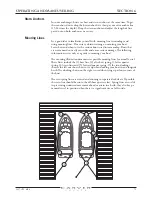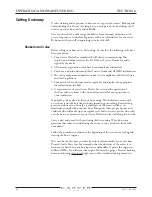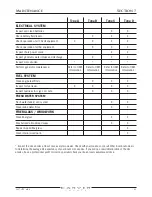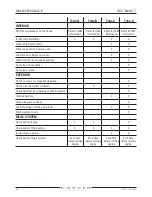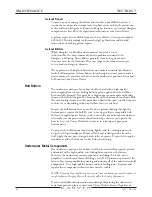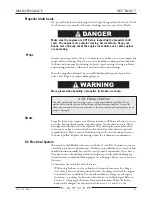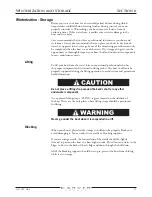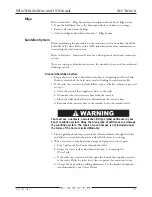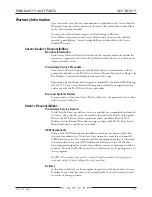
92
3327 • P2 6/06
MAINTENANCE
SECTION 7
Carpet
The carpet used on the interior of the boat has been treated with a stain
protector. Even so, the carpet still needs periodic cleaning. Care for the carpet as
you would care for the carpet in your home. Vacuum it often and shampoo it as
needed using a carpet shampoo.
When your boat is new, the carpet sheds and needs to be vacuumed frequently.
This is normal. The shedding stops after a few weeks.
Interior Fiberglass
Some of your boat’s interior components, such as the shower stalls and
stateroom berth platforms, are made of gelcoated fiberglass. Interior fiberglass
can be cleaned with any household cleaner that has been made for cleaning
fiberglass. Many of these types of cleaners are marketed as “tub and tile”
cleaners. Do not use abrasive cleaners on the interior fiberglass surfaces. Abrasive
cleaners scratch and dull the shiny gelcoat surface.
Plexiglass
The shower door, mirrored face of the head medicine cabinets, and other areas of
your boat are made of plexiglass. Clean plexiglass with a solution of fresh water
and mild liquid detergent. Remove any fine scratches with a fine automotive
acrylic rubbing and polishing compound.
Do not use glass cleaners, abrasive cleaners, or aromatic solvents on
plexiglass. Doing so etches the plexiglass.
Mechanical Systems
The following paragraphs explain how to maintain your boat’s propulsion,
electrical, fresh water, bilge and sanitation systems.
Engines/Generator
Refer to the engine and generator OEM information for instructions on
maintaining your boat’s engines and generator. There may be a seawater
strainer installed in the water intake lines for each engine and the generator. At
least once every 30 days, close the seawater seacocks, then open and clean the
strainers. Refer to Section 9 - Hatches and Section and/or Engine Room for
the exact location of the strainers. If you are operating the boat in dirty waters
or areas with a high degree of aquatic vegetation, inspect the strainers more
frequently. A clogged strainer restricts the intake of seawater which can cause the
affected engine or the generator to overheat.
Thru-Hull Valves
Inspect the thru-hull valves on a monthly basis. Make sure the connections
between the hose and the valve are tight. Look for water leaks around the area
where the valve and hull meet. Every 30 days open and close each valve two or
three times. This guards against the valve seizing in the open or closed position.
While doing this make sure the valve handle is securely fastened. Tighten any
loose handles. Refer to Section 9 - Thru-Hull Fittings for the location of the
thru-hull valves.
Summary of Contents for 380 SPORT
Page 1: ...HIN CDR _________________ 380 Sport Owner s Guide 2007 Version 1 ...
Page 2: ......
Page 4: ......
Page 6: ......
Page 8: ......
Page 28: ......
Page 40: ...28 3327 P2 6 06 DC ELECTRICAL SYSTEM SECTION 2 DC SCHEMATIC 3327 324 002 5 12 7 05 ...
Page 54: ...42 3327 P2 6 06 AC ELECTRICAL SYSTEMS SECTION 3 AC SCHEMATIC 3327 300 015 2 9 04 ...
Page 108: ......
Page 122: ......
Page 124: ...112 3327 P2 6 06 WARRANTY AND PARTS SECTION 9 Hatches ...
Page 129: ...3327 P2 6 06 117 WARRANTY AND PARTS SECTION 9 Bill of Material ...
Page 130: ......
Page 131: ...3327 P2 6 06 119 WARRANTY AND PARTS SECTION 9 Carver Limited Warranty ...


